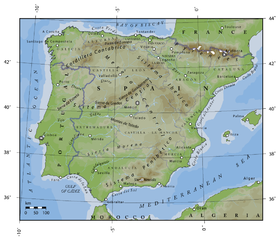We travelled back to the village yesterday, from Valladolid, along one of my favourite roads, the one in Soria which goes from El Burgo de Osma past Gormaz and through Almazán. It's best travelled in the present season, autumn, to enjoy the trees, ranging in colour from bright yellow to dark green, that trace the route of the Duero as it passes through the province, for much of its route alongside the road. There may not be too much of autumn left: the snow on the faces of Las Tres Sorores was visible from the slopes of La Muela, 150 kilometres away.
In between Soria and La Muela we were obliged to pass a car which, despite having a temporary, small spare tyre fitted at the back, was nevertheless being driven at close to the speed limit up and down the mountains, swerving constantly into the overtaking lane as it did so. I had time enough to think that there had to be a metaphor in that, for life in Spain today: but what with trying to avoid the driver killing us, I didn't have time to work out exactly what it was.
But we got home. Safe home. Home in our village somewhere between Huesca and Barbastro. Close enough, I should imagine, to the geographical centre of Huesca province, were it possible to determine where that centre lay. In no other sense is it at the centre of anything. It is not, quite, Aldeaseñor, but it is small, its population is old, and to take the last turn to the village is almost to pass out of the world into a separate zone, where nobody comes except people who are coming to the village, where deer leap out in front of you, where hares leap out right at you and where, sometimes, wild boar hide behind hedges in the dark. We like it here. We feel separate, and we feel safe.
The house is very small, but it's paid for. We are not among the hundreds of thousands in Spain who are fearful of losing theirs. A man killed himself in Granada last week, just before he was due to be evicted: another, in Valencia province, threw himself off a balcony. These were not people who had somewhere to hide from the world. These were people who had run out of places to hide.
Eviction figures go up and up. Thirteen percent in the second quarter. There are empty flats and houses all over the country. The unemployment rate set a new record this week, more than 25%. (The IMF - as if it ever, ever did anything else - has revised its previous forecast of growth downwards, so that the policies which it recommended and approved are now expected to cause another year of financial contraction. No IMF personnel will lose their homes as a result of this mistake.) But we are throwing people onto the street so that their homes can be returned to a housing market which has collapsed. Which has collapsed not least because of the actions of the financial institutions which are putting people on the street.
There were protests outside the Cortes yesterday, against the budget, another budget consisting of enormous cuts, to go with the ones we have already had this year and the further ones which are undoubtedly to come. Cayo Lara characterised the budget as being riddled with concessions to
the banks, the speculators and the fraudsters.These are not necessarily seen here as three different categories. Which is less than fair, but not, I think, quite as unfair as throwing people out of their homes, at the behest of the banks, because of an economic disaster to which the banks were substantial contributors.
This cannot go on, but it will. It will, and while it does, pay cuts will be recommended by people who do not expect to suffer them, and insecurity in employment and housing will continue to be recommended as an economic incentive by people who have no idea what it is to suffer it. I have never, personally, been on the street, but I have been close, and what it felt like was not an incentive to anything other than fear and desperation.
Here, we feel safe. It is Sunday morning. The church bells have rung in the tower behind our house and those villagers who are believers have attended Mass. The sun is shining and the sky is clear, presaging the coldest night for months. I can hear birdsong. We are at rest. Everything is at rest.
We seem so very far from fear and desperation. But it is all over the country, in the minds of millions. Before too long, we may learn what the desperation of millions actually looks like. Because of stupidity and recklessness and callousness, we may learn what desperation on a mass scale looks like.
[Las Tres Sorores: Clima y Nieve Pirineos]










